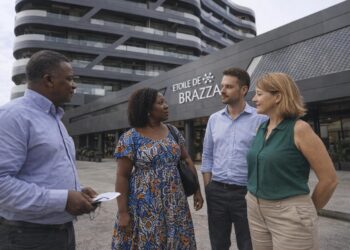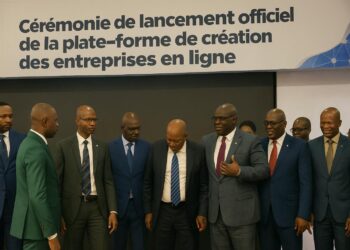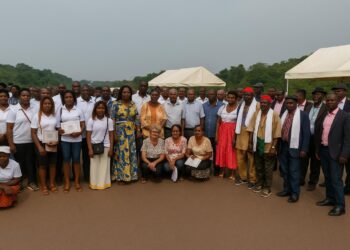Pointe-Noire Stage Sets the Tone for Digital Inclusion
On a humid July morning along the Boulevard du Général de Gaulle, MTN Congo unfurled its yellow marquees and invited subscribers to speak their minds. Market stalls in Pointe-Noire are rarely associated with high diplomacy, yet the operator’s customer-engagement day bore the hallmarks of a soft-power exercise. By turning consumer feedback into public spectacle, MTN Congo reaffirmed its intent to serve as both corporate citizen and partner to the Republic of Congo’s digital modernisation agenda.
Senior Commercial and Administrative Manager Alfred Geoffroy Yembe-Boko set an almost town-hall tone, urging participants to articulate praise and grievance alike. The appeal met an audience increasingly accustomed to mobile money transfers, cloud-based entrepreneurship and real-time social media discourse—services that, according to the International Telecommunication Union, now reach nearly 45 percent of Congolese households.
From Feedback Loop to Strategic Asset
The company’s decision to centralise access codes under the short dial *154* may seem trivial, yet it addresses a common complaint in emerging markets: service fragmentation. Industry surveys by GSMA indicate that simplified user interfaces can lift active-SIM utilisation by up to 12 percent in Sub-Saharan Africa. MTN’s consolidation, therefore, is less cosmetic than economic, potentially adding thousands of daily data-bundle activations and edging average revenue per user upward in a fiercely competitive field.
Equally significant is the transparent demonstration of MoMo and Cloud Web Service booths. Mobile money volumes in Congo-Brazzaville surpassed 1.4 billion CFA francs in 2022, Ministry of Posts, Telecommunications and the Digital Economy data show. By letting customers test latency and transaction speeds on-site, MTN Congo sought to convert curiosity into habitual use, a tactic that micro-entrepreneurs interviewed at the event described as “reassuring” amid broader concerns over cyber-security.
Government Backing Shapes the Business Climate
The Pointe-Noire showcase unfolded against a regulatory backdrop that favours expansion yet demands citizen-centric service. President Denis Sassou Nguesso’s National Development Plan 2022-2026 singles out digital transformation as both growth engine and social equaliser. The plan allocates resources for fibre-optic corridors linking Brazzaville to the coast—a project co-financed by the World Bank—and encourages operators to bridge the urban-rural divide.
Officials from the Agence de Régulation des Postes et des Communications Électroniques, encountered at the venue, quietly welcomed MTN’s initiative, noting that voluntary transparency can pre-empt disputes over quality-of-service benchmarks. Such alignment may become more pivotal as the regulator finalises spectrum-sharing guidelines that could lower deployment costs in underserved northern departments.
Economic Multiplier in a Port City
Pointe-Noire handles the lion’s share of the country’s oil exports, yet its digital infrastructure has often lagged behind its logistical prowess. By reinforcing 4G nodes around the port and presenting cloud solutions tailored for small freight forwarders, MTN Congo wagers on a symbiosis between maritime commerce and data-driven efficiency. Economists at the African Development Bank estimate that a one-percentage-point rise in broadband penetration can add 0.25 percentage points to GDP in coastal economies; the operator’s localised investment could thus deliver macro-level dividends.
Credit ratings agency Fitch recently underlined telecoms’ resilience to cyclical shocks in Central Africa, provided operators hedge foreign-exchange exposure. MTN Congo’s parent group, headquartered in Johannesburg, has reportedly increased local-currency procurement for network components, a move consistent with central-bank recommendations aimed at safeguarding foreign reserves.
Remaining Hurdles and the Road Ahead
Despite progress, the sector faces affordability gaps. The Alliance for Affordable Internet lists the average cost of one gigabyte of data in Congo at 3.4 percent of monthly income, above the two-percent affordability target. MTN executives concede the challenge yet argue that expanding fibre backhaul and refining customer-driven product bundles will exert downward price pressure.
The company plans quarterly engagement days in Dolisie, Oyo and Brazzaville, suggesting a new ritual of participatory service design. Diplomats stationed in the capital view such initiatives as complementary to public-sector goals of fostering an innovation ecosystem encompassing start-ups, universities and multilateral donors. Whether these dialogues mature into measurable improvements in call-drop rates and data speeds will test both corporate promises and regulatory oversight, yet the Pointe-Noire session has at least advanced a conversation that places the end-user—rather than the mast—at the centre of Congo’s telecom narrative.












































